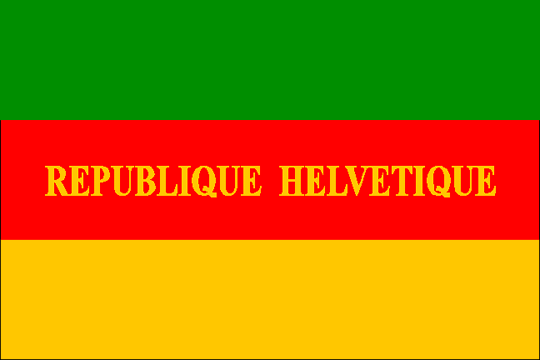Lesson 6 - The Helvetic Republic and Swiss Confederation 1798-1815
The Helvetic Republic (1798-1803)
121 representatives of the territories Aargau, Basel, Berne, Fribourg, Léman (Vaud), Lucerne, Oberland, Schaffhausen, Solothurn and Zurich met in Aarau on April 12th, 1798 to proclaim the Helvetic Republic and confirm its new constitution. The new régime abolished cantonal sovereignty and feudal rights. In its place, the French occupying forces established a centralised state based on the ideas of the French Revolution, a new tricolour flag and an official seal (with William Tell and a liberty tree).
121 representatives of the territories Aargau, Basel, Berne, Fribourg, Léman (Vaud), Lucerne, Oberland, Schaffhausen, Solothurn and Zurich met in Aarau on April 12th, 1798 to proclaim the Helvetic Republic and confirm its new constitution. The new régime abolished cantonal sovereignty and feudal rights. In its place, the French occupying forces established a centralised state based on the ideas of the French Revolution, a new tricolour flag and an official seal (with William Tell and a liberty tree).
|
The new constitution was not so much a democratic experiment, but an attempt to make French control easier.
The Helvetic Republic faced opposition from the very beginning from supporters of the Ancien Régime, Catholics who resented the revolutionary secular (anti-religious) policies and the cantons who had lost power. |
Resistance spread when new taxes were imposed, and French soldiers exploited the territory they occupied. And then in February 1799 Switzerland became the battle ground as France launched the War of the Second Coalition against Austria and Russia. Swiss soldiers were called up to fight for France, Swiss land and property was requisitioned (taken) and Switzerland was officially stripped of its neutral status.
|
The war severely weakened the Helvetic Republic. Its attempts to introduce radical reforms, to abolish tithes and feudal dues, lacked the resources to make it possible. And the leadership became increasingly divided. Firstly, La Harpe forced out Ochs and then La Harpe in turn was forced into exile after a failed attempted coup.
Instability in the Republic reached its peak in 1802–03. When the French soldiers left Switzerland in 1802, Napoleon had confiscated all weapons to prevent the Swiss from fighting back. But federalist rebels from the cantons of Bern and Zurich launched an assault on the forces of the Helvetic Republic with wooden clubs, earning the brief war the name Stecklikrieg, or 'war of sticks'. (Left) |
A solution to the problem was finally forced on the Swiss by Napoleon who was by 1803 convinced that Switzerland was federal ‘by nature’. He imposed a ceasefire between the conservative Federalists and radical Unitarians and then a new constitution which was called the Act of Mediation. (See the 'interview' with Napoleon below!)
|
The Helvetic Republic had failed, but it had given Switzerland unity, national symbols, institutions and citizenship for the very first time. Importantly for places like Vaud, it had also expanded the number of independent cantons. Swiss Confederation 1803-1815 The Swiss Confederation was re-established as a result of the Act of Mediation issued by Napoleon Bonaparte on 19 February 1803. It restored the 13 former cantons and added 6 more. There was also a Federal Diet. It was very much a compromise. The Federal Diet would meet once a year by rotation in six cantons (Fribourg, Bern, Solothurn, Basel, Zurich, Luzern). The highest officer in the host canton became the Landammann (Chief Magistrate) of Switzerland and ruled the country for the subsequent period. This is the only time in Swiss history when a single person ruled the land. |
There was no return to absolute rulers from before 1798, popular assemblies were restored and there were to be no privileged classes. But former rulers did return and most importantly, Switzerland remained a protectorate of France, bound by a military alliance and a requirement to provide soldiers for the French army.
|
|
The mediation period of the Swiss Confederation was a big improvement on the instability and war that had characterised the Helvetic Republic. Napoleon’s Continental System cut off British exports of textiles and encouraged the development of a domestic Swiss industrial capitalism. (See industrial revolution) Agriculture modernised and the Mediation governments encouraged public works. New national Swiss institutions were encouraged such as the Helvetic Society of 1807 and the Swiss folk games in Interlaken in 1805, which featured wrestling and yodelling. For the first time, Swiss patriotic identity extended beyond the educated elite. |
But Switzerland was never fully independent at this time. 30,000 Swiss served in Napoleon’s Grand Army; some marines even served at Trafalgar. In 1806 the principality of Neuchâtel was given to Marshal Berthier. Ticino was occupied by French troops from 1810 to 1813. Also, in 1810 Valais was occupied and converted into the French department of the Simplon to secure the Simplon Pass. Napoleon regularly considered annexing the whole country, but as long as he ruled, the divisions between conservative federalists who wanted to restore the Ancien Régime and radicals who wanted to preserve their revolutionary gains, remained contained. As soon as Napoleon was weakened civil war threatened once again.
Activity
Read the text and watch the film about the Act of Mediation.
1. What was the Helvetic Republic? Why did it become so unpopular?
2. What did the Act of Mediation set out to achieve? How successful was it?
Read the text and watch the film about the Act of Mediation.
1. What was the Helvetic Republic? Why did it become so unpopular?
2. What did the Act of Mediation set out to achieve? How successful was it?




